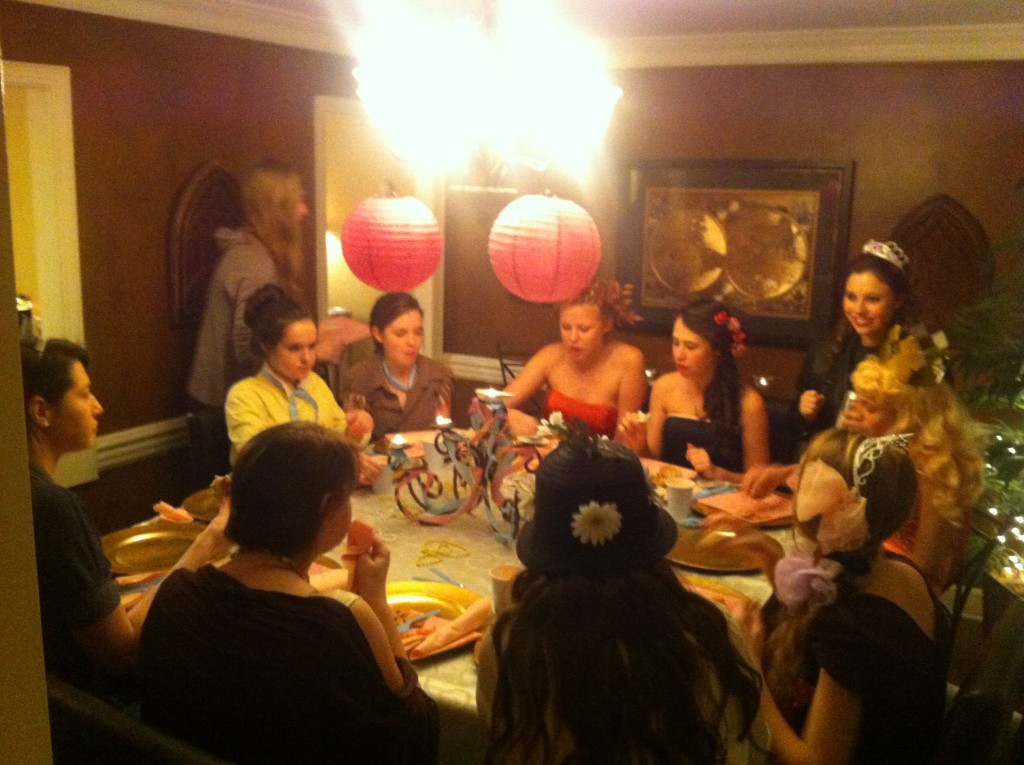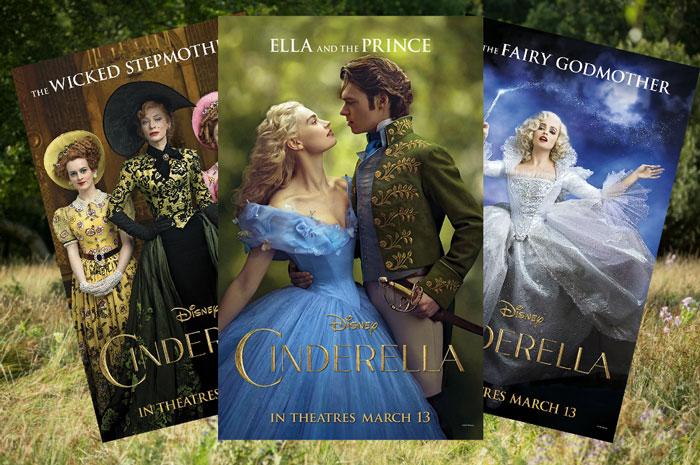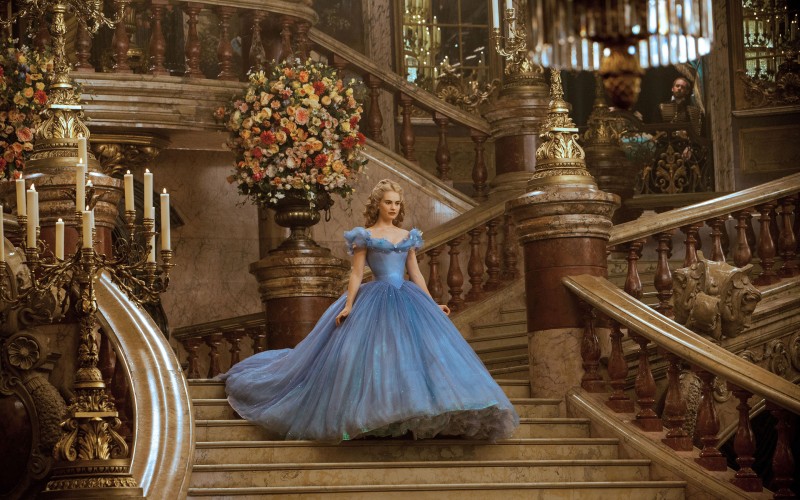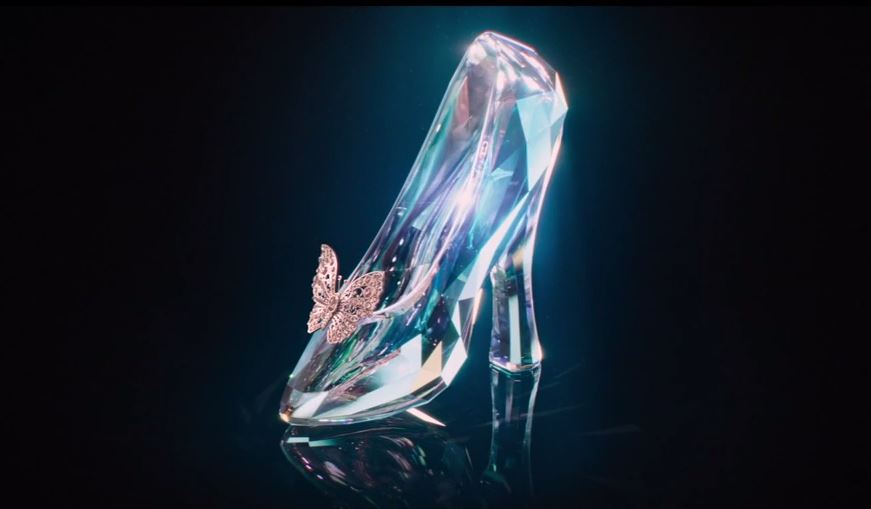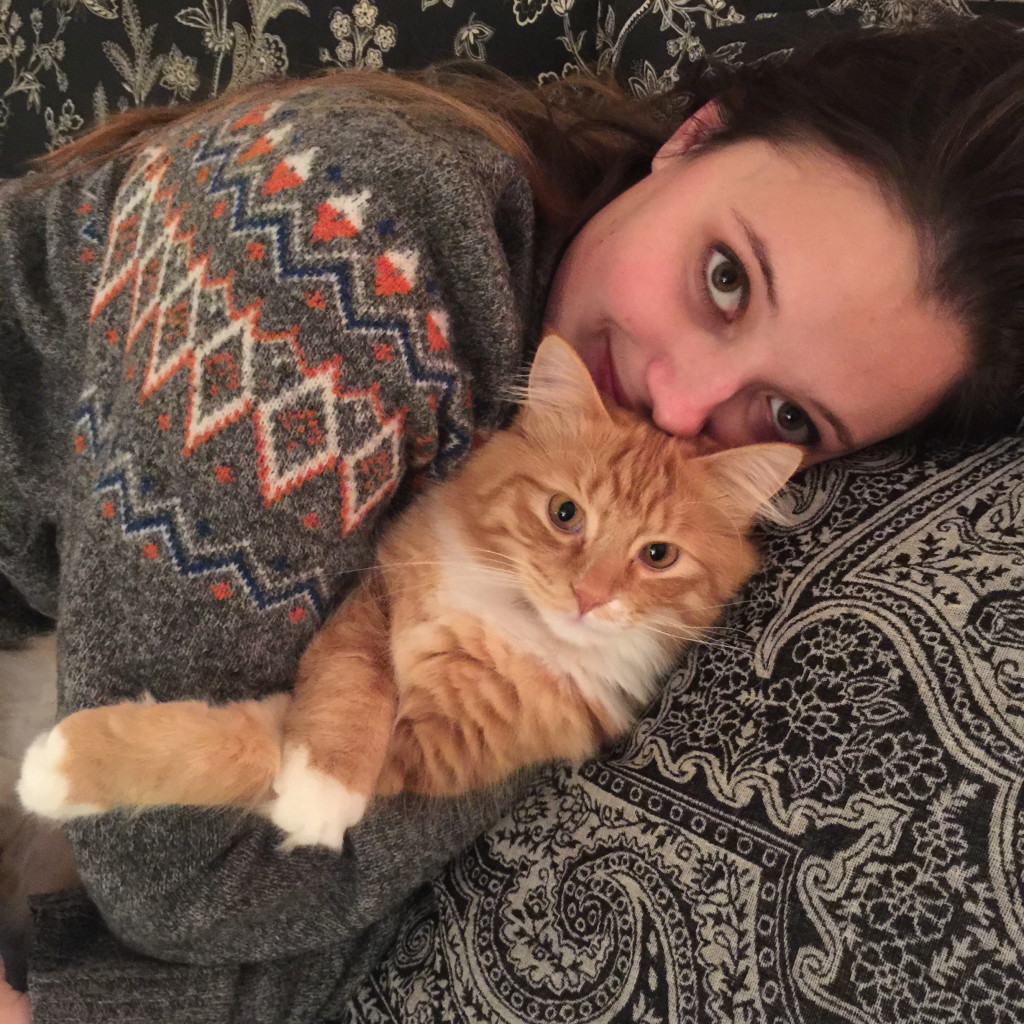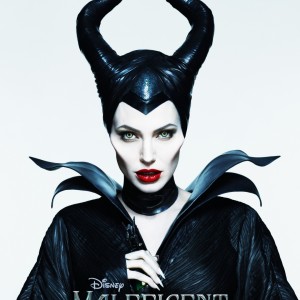I think it is kind of crazy for me to admit that so far, my favorite movie of 2015 is a live action remake of a Disney Princess cartoon from the 50’s. I did not have high hopes for this movie when I went with a gaggle of girls to see it a few weeks ago for my buddy Anna Jackson’s birthday. I mean, as a sprouting movie buff with a potentially devastating arsenal of criticism and analysis, I went into the theater with knives a sharpened, ready to gleefully eviscerate the bloated corpse of an obvious Disney cash-grab with extreme prejudice. As the many advertisements and trailers ended, Disney presented a Frozen short. I got the impression that the fullness of the theater was directly attributed to the promised glimpse at Anna and Elsa of Arendale. Since Frozen was still an undeniable cultural behemoth even a year and a half after its release, it didn’t surprise me that its many, many fans would pay good money to see a third rate Disney remake if the shrewd producers dangled a tantalizing short in front of us as bait. The short, Frozen Fever was decent enough. Elsa had allergies or something, which I as the proverbial bubble child greatly related to. It ended to a thunderous applause by the many female fans in the theater and I waited with complete certainty that the feature, Cinderella, would doubtlessly flounder and die. I licked my lips, mind ready to pounce.
I watched the movie. The credits rolled. I applauded thunderously with the entire theater as I clapped with an enthusiasm that would have made the Maddie from two hours ago do a double take. I was pleasantly surprised, to say the least, to find that this “third-rate cash grab” was made with an appreciation and warmth that is almost nonexistent in the modern moviesphere so inundated with cheap, effects-laden remakes and soulless, grittily-rebooted blockbusters. They made Cinderella (an animated movie from 1950 that most people slept through) actually enjoyable! In my opinion, this recent remake was even better than the original (now I suppose I must turn in my hipster badge and irony firearm because I have just admitted that a modern reboot was better).
Look, I like every other girl in America, watched all the Disney Princess movies. I had a princess birthday party, a bunch of princess dolls, and all the VHS tapes (remember, this was the early 2000’s) of the Disney movies on repeat. Of all the animated movies, my favorite was Beauty and the Beast (duh) and my least favorite was Cinderella. I just had a really hard time relating to Cinderella’s character. In one word, she was BORING. I know the whole happy-even-though-she-is-being-brutally-abused thing is an integral part of her character, but come on! In the original movie she contributes nothing to the story. She is a completely one-dimensional, passive character who just sort of lets stuff happen to her. Now I know that’s sort of a product of the times, 1950 wasn’t really known for its spunky heroines who define their own futures, but even Snow White from 1937, who spends the Third Act of her own movie comatose had a 100 times more personality then the animated Cinderella. Snow White gets stuff done.
She successfully organizes a house populated by seven bachelors just because she can. Cinderella’s hard-working for sure, but she doesn’t really do much. By far the worst character in the animated Cinderella movie is the Prince. The guy literally does not have a name, even in official Disney merchandise. He and Cinderella just sort of dance around and boom, in love. Not even a single conversation passes between them. I think the prince only has one line in the entire movie which is “Where are you going?” The dude is eye-candy plain and simple. A waltzing Roomba could replace his character and there wouldn’t be any difference in the story. The original Cinderella is pretty and pointless, which is why I had really, really low expectations for its modern adaptation. Well at least it couldn’t be worse then Maleficent.
The 2015 version of Cinderella was amazing. It blew all my preconceived prejudices and biases out of the water. First of all, it was amazingly well made. I’m talking Oscar-worthy costuming and set design. The few months I spent working with the set team for V2 made me really appreciate how much work goes into the costumes and set pieces in a production. The dresses, the scenery, the little tiny touches in the furniture and paintings were all absolutely breathtaking. Cinderella’s blue gown, the one she goes to the ball in, it was absolutely stunning. I’m letting my REALLY girly side show on this, but good gracious Lord that dress was beautiful. I read an article that said Cinderella’s dress used more than 270 yards of fabric, with 10,000 Swarovski crystal sewed into it. It took 18 tailors 500 hours to make. I usually don’t think clothes are worth squealing over, but darn it I’m going to squeal over that dress. It was gorgeous, all the costumes in that movie were gorgeous. Sandy Powell, the costume designer, deserves her fourth Oscar for that one.
But even beyond the wonderful aesthetic production values, the story and acting made me really connect with this ancient story, retold for countless generations about a poor, downtrodden girl who rises from the ashes and wins the heart of the ruler with the help of a little magic transformation. Cinderella was still the same good, selfless girl who did thankless tasks and took heaps of abuse with a good attitude, but this time around we got to see why she was able to do that. It takes a lot of work to be good and selfless in the face of ugliness and evil. This version’s Cinderella, played convincingly by a sparkly-eyed Lily James, shows us her early life marked by happiness and kindness that was ingrained into her by her parents, who told her to “Always have courage and be kind.” When that childhood abruptly ended and left her an orphan under the oppressive rule of her wickedly manipulative and cruel stepmother, Cinderella uses her parents’ lessons to keep out of despair and protect her ancestral home. But what this movie shows is how hard cruelty can be, even to the most selfless of people. When her stepmother refuses to allow her stepdaughter to even eat with them at breakfast and mocks her disheveled appearance, Cinderella flees to the forest in tears. But fate allows her to run into a royal hunting party led by the handsome (and this time named) Prince Kit. When she intervenes for the sake of the stag the party is hunting, Kit becomes enamored with her kindness and courage, and by the fact that she does not recognize him as the prince and speaks freely. I was taken by the great chemistry shared by Cinderella and Kit even in this early scene that made the whole love at first sight shtick palpable to me, the jaded modern viewer.
Thus proceeds the classical Cinderella story of a ball, the stepmother refusing to let Cinderella go, the fairy godmother’s intervention, and the gorgeous dance between the prince and the mystery woman, Cinderella. But also added is the relationship between Prince Kit and his father the King, who sees how Cinderella’s outlook of courage and kindness has made his son a better man and future king. He allows his son to marry a common girl for love rather than a princess for advantage.
There is the search for the girl with the glass slipper, but in this version, Cinderella’s wicked stepmother sees the initial profit to be gained by letting Cinderella become queen, and offers to let Cinderella answer the prince’s summons if she makes the stepmother head of the palace household and puppet master of the Prince. But Cinderella, knowing that the safety of the kingdom and the freedom of the Prince would be jeopardized by such a situation, refuses the stepmother’s offer and is resigned to her life of drudgery as a result.
But the prince finds her and even with the revelation that his true love is nothing more then a poor scullery maid, he choses her as his bride anyway. Before she leaves to become queen, Cinderella turns to her cruel and wicked stepmother and forgives her for the years of torment, destroying the woman’s cold exterior and making her see how evil she truly was. The bible teaches about not being a slave to unforgiveness. Forgiveness has truly great power!
I thought this version gave the old story an emotional element yet unseen. It had high stakes and high tension but a big payoff in the end. It was a beautiful movie that kept the traditional fairy tale heart intact in a world populated with revisionist twists and gritty reboots. I thought that was quite the achievement to craft a fairy tale that would appeal to the modern view. It was truly a wonderful movie that will delight anyone. Cinderella is for once a great role model, strong and selfless and well as courageous and kind. She suffered, but that suffering only refined her into a more empathetic person who could understand the pain of others, even those who were unkind to her. It is ironic that this kindness to those who may be cruel to you is exactly what we were learning at church. I saw the film again a few weeks later and it was even better the second time.
4 out of 4 stars

